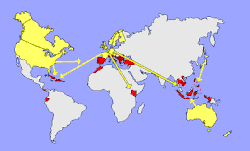Female sex tourism
|
|
|
 |
|
| Destination map of female sex tourism: Female tourists' home countries: Australia, Austria, Belgium, Canada, Denmark, Finland, France, Germany, Ireland, Japan, Netherlands, New Zealand, Norway, Sweden, United Kingdom, United States Destination countries: Balkans, Cambodia, Caribbean, Costa Rica, Ecuador, Greece, Indonesia, Italy, Kenya, Morocco, Philippines, Portugal, Spain, Thailand, Turkey, Vietnam |
|
|
|
|
| Romance tourism | |
| Sex tourism | |
Female sex tourism refers to sex tourism by females, who travel intending to engage in sexual activities with a sex worker. Female sex tourists may seek aspects of the sexual relationship not shared by their male counterpart, such as perceived romance and intimacy. Women – especially wealthy, single, older white women – plan their holidays to have romance and sex with a companion who knows how to make them feel special and give them attention. The prevalence of female sex tourism is significantly lower than male sex tourism.
Female sex tourism occurs in diverse regions of the world. The demographics of female sex tourism vary by destination, but in general female sex tourists are usually classified as women from a developed country, who travel to less developed countries in search of romance or sexual outlets.
Female sex tourists can be grouped into three types:
Within the realm of female sex tourism, male sex workers are vital for the satisfaction of these women, whether physical or emotional. Without the employment of local sex workers, sex tourism for both men and women would not exist. Sex tourism is becoming a global phenomenon. With this movement of different populations to different countries, problems concerning health increase, especially ailments involving sexually transmitted infections (STIs) and HIV/AIDS. Women involved with sex tourism do not find themselves using barrier contraceptives during the majority of their visit, leaving them unprotected against STIs.
There is an ongoing debate on terminology regarding female sex tourism. Pruitt and LaFont argue that the term female sex tourism is not representative of the relationship that female tourists have with local men. They argue that female sex tourism oversimplifies the motives of these women and that romance tourism explains the complex nature of what these women are engaging themselves in while involved in romance tours. They also state that the expression female sex tourism "serves to perpetuate gender roles and reinforce power relations of male dominance and female subordination, romance tourism in Jamaica provides an arena for change".
...
Wikipedia
